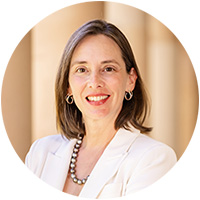Paving the way for a low-carbon future:
transforming business through
sustainability education and research
Climate change has far-reaching effects on the world as we know it, with impacts ranging from rising sea levels displacing coastal communities to natural disasters disrupting global supply chains.
As a result, sustainability in business has become a significant focus. Companies worldwide face increasing pressure to adopt environmentally and socially responsible practices, such as setting carbon reduction targets, implementing circular economy principles, and investing in renewable energy.
At The University of Queensland (UQ) Business School, sustainability is a core principle guiding research and education. The School’s Business Sustainability Initiative (BSI) leads the way in championing sustainable business practices. Through partnerships with industry and government, academic experts within the BSI are at the forefront of developing strategies for a sustainable future. Research projects address issues including corporate sustainability, social impact and entrepreneurship, resilience to climate change, and the interaction between environmental, social and governance (ESG) issues and financial markets.
UQ Business School’s commitment to sustainability doesn’t end with the BSI. Through a wide range of research projects and education initiatives, the School exemplifies how universities can play a pivotal role in driving sustainable business practices and preparing future leaders to tackle the complex challenges of sustainability.
Collaborating with Australia’s top sustainability innovators
UQ Business School has joined the Business Council for Sustainable Development Australia (BCSDA).
The BCSDA is an alliance of Australia’s most forward-thinking companies and organisations, focused on accelerating the transition to rapid decarbonisation and meeting the United Nations Sustainable Development Goals (SDGs).
Head of UQ Business School Professor Brent Ritchie said the membership would allow the School to leverage several key opportunities in collaboration with the BCSDA.

“We’re proud to be one of the BCSDA’s 2 university partners,” Professor Ritchie said.
“Joining the Council will allow us to make an impact by contributing to BCSDA submissions on government policy, participating in working groups, and promoting our research through national and international networks.
“We’ll also have access to funding opportunities – such as ARC Linkage Grants – that support joint research and development initiatives.”
Professor Kathleen Herbohn, Co-Lead of the School’s Business Sustainability Initiative Research Hub, said the BSCDA connection would benefit students, researchers and the general public.
“As we work towards a more sustainable business landscape, our involvement with the Council will ensure UQ Business School remains at the forefront of sustainability research informed by emerging issues in business,” Professor Herbohn said.
“We’re excited to produce research that shapes federal sustainability policy and integrate these insights into our teaching to educate tomorrow’s business leaders.”
Sustainability research, education and training
Net Zero Observatory
As businesses, governments, and everyday people grapple with the consequences of climate change, researchers at UQ Business School’s Net Zero Observatory (NZO) are designing strategies to drive rapid decarbonisation.
Established through Professor Matthew Hornsey’s ARC Laureate research, the NZO partners with academics, industry, government, not-for-profits and community groups to accelerate action and foster support for the path to decarbonisation.
NZO Co-Lead Professor Belinda Wade said their current focus was examining techniques to defuse misinformation about electric vehicles and windfarms, increase trust in the decarbonisation process, and inform organisational climate change management.
Climate Change Executive Education program
For the first time, UQ Executive Education is offering a customisable Climate Change program to help organisations tackle new challenges in the transition to a low-carbon future.

Professor Wade said the program brought together UQ Business School and Executive Education experts to upskill companies on the impacts of climate change, net zero pathways and mandatory climate reporting.
“The program provides participants with core knowledge on climate change while allowing for deep dives into key topics such as climate communication and the legal risk of climate change for directors,” Professor Wade said.
“We’re also happy to work with clients to tailor each program to meet their specific needs.”
Research on the impacts of mandatory climate reporting
In Australia, the introduction of mandatory sustainability reporting standards marks a significant step towards greater transparency and accountability.
As of 2025, large companies must disclose their climate and sustainability-related plans, financial risks, and opportunities under the Australian Sustainability Reporting Standards (ASRS) developed by the Australian Accounting Standards Board (AASB).
These standards align with international frameworks, ensuring Australian businesses are part of the global effort to address climate change and promote sustainable development.
To further this work, a major UQ Business School research project funded by AASB will investigate changes in organisational behaviour and disclosure practices in response to mandatory climate-related reporting.
Led by Professor Herbohn and Professor Wade with their UQ Business School colleagues Dr Saphira Rekker, Dr Michael Turner and Ankit Jain, the research began in 2024 and will wrap up in 2027.

“Expected research outcomes include providing a conduit for report preparers and investors to inform policymakers and regulators about what’s working well in climate-related reporting, areas where more guidance and clarity are required, and any unintended consequences from the reporting mandate,” Professor Herbohn said.
Professor Wade noted that although the new reporting standards were developed for those who rely on general-purpose financial reporting, the information they release is important to everyone.
“Understanding climate-related risks and opportunities is vital for all stakeholders and for the longevity of the companies themselves due to effects such as altered demand for products, disruption of supply chains, or access to finance,” Professor Wade said.
“This new transparency allows everyone to evaluate a company's climate management and decide whether to invest in them, work for them, or purchase their products.”
Chartered Banker Institute partnership
Furthering its sustainability offerings, the School has partnered with the UK’s Chartered Banker Institute (CBI) to offer specialised climate change education to the banking sector.
“This partnership allows UQ Executive Education to provide facilitated workshops incorporating CBI educational materials,” Professor Wade said.
“These materials include CBI’s programs on climate change and responsible banking for board members and executives, which align with the United Nations Principles for Responsible Banking (UNPRB).
“Our goal is to assist Australian financial institutions in building their climate literacy, enabling climate-safe, transition-aligned decision making."
Sustainability-focused accounting elective course
UQ Business School’s Accounting discipline will offer a new elective course, Sustainability Reporting and Assurance, from Semester 2 2025.
This course will prepare undergraduate commerce and business students to navigate the complex sustainability and climate-related disclosure requirements now faced by companies in Australia and overseas. A key aim of the course is to provide graduates with climate and financial literacy.

